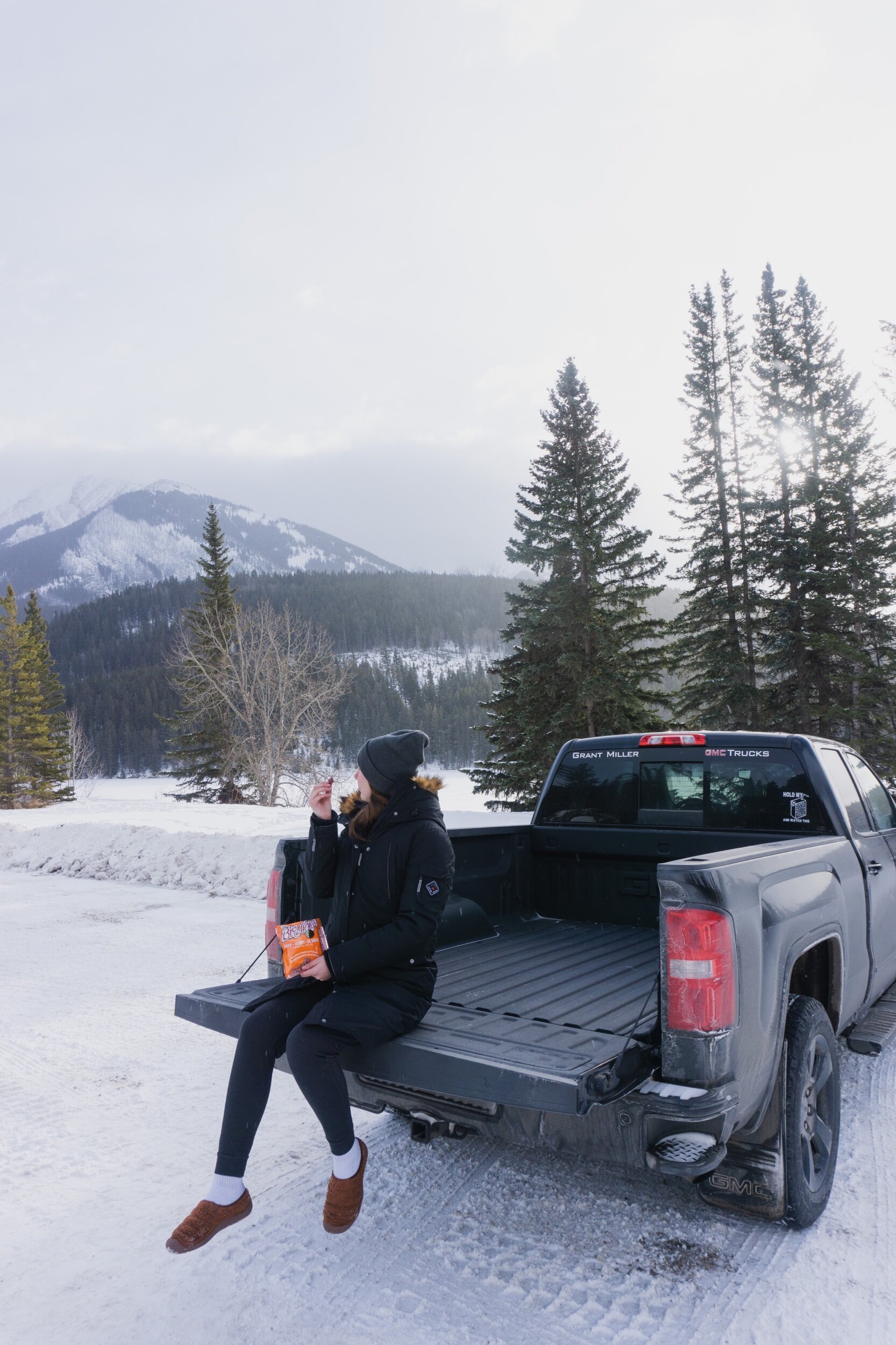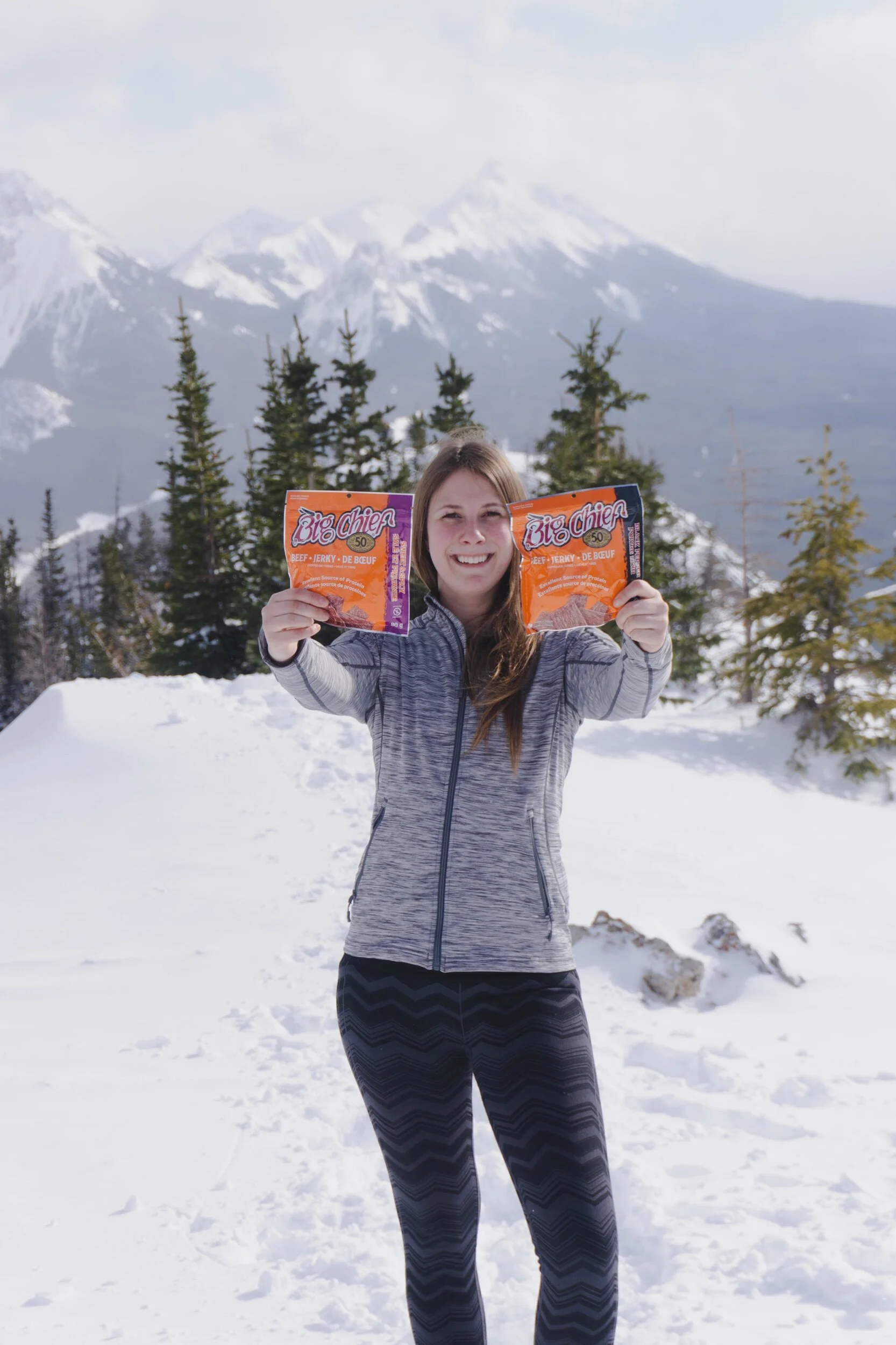Tips for Staying Hydrated While Hiking
… and fed + full! I’ve compiled a list of my favourite trail eats and tips for staying hydrated while hiking. Whether you are taking a day hike, or a multi-day backpacking trip, choosing the right food and hydration apparatuses to bring on the trail is a big step to planning. I’m here to help make choosing the right food + gear a little easier and providing tips you may not know!
Tips for Food on the Hiking Trail
• You want to choose things that will help fuel you and provide you energy, and helping you feel full without weighing you down. The best foods will be nutrient dense and provide lasting energy. Stay away from sugary foods that only offer a quick boost of energy, and choose proteins, complex carbohydrates and healthy fats that are digested more slowly and release a steady supply of energy.
• Choosing lightweight and compact food is critical when doing multi-day hikes so you’re taking up as little vulnerable space as possible. Repackage bulky products to save more room. Planning out easy-to-prepare meals beforehand will help make this step easier!
• Always bring a little extra. You want to ensure you’re packing enough food for the amount of time you’ll be on the trail, and a little bit more for unforeseen circumstances. If you are doing a multi-day trip, estimate how many calories you will burn that by considering your weight, the hike challenge, your packs weight and how long you plan to hike each day. If you want to maintain your weight throughout the hike, pack enough food to make up for all the calories you’ll burn each day. If you’re in cold weather, your body will also need more calories to stay warm
• Plan easy-to-prepare meals. Meals that can be made in one pot, or without utensils, are convenient and best for most on the trail. You are able to make freeze dried meals, rice, instant noodles and more. Minimal preparing and cleanup means you have more time to relax and rest for the next day.
• Pre-hike meals are just as important as meals on the trail. This is the time to fuel up for your day ahead. Some of the best foods to eat before hitting the trail — Oatmeal, Eggs, Fruits, Vegetables, Nut Butters, Lean Meats & Pasta.
The Best Trail Snacks (in my opinion…)
1. Big Chief Beef Jerky
Beef Jerky is such an incredibly convenient snack to bring on the trail, you can’t go wrong with it. Being from Alberta, I choose to support a local, & well-known company for all my jerky needs! Big Chief is my go-to trail snack and I never leave my house without! With their compact packaging and smaller bites, it makes it super easy to pack along on any trip without worrying about takin up too much space. Big Chief, originated in Calgary, AB and is actually celebrating 50 years in business this year in 2021! To celebrate, they’ve released 2 new flavors of their 100% Canadian Beef Jerky — Black Pepper and Sweet & Spicy, in addition to their other flavors — Original, Teriyaki, Hot & Jalapeño. I have to say that Sweet & Spicy is my new favorite, with Teriyaki being the OG favorite! Have you tried their new flavors yet?!
2. Cheese
Cheese is packed with protein and calories, making it a great option to eat while on the trail! Cheese can also add richness to almost any meal and being available in so many varieties, you’ll never get sick of it. Cheese keeps well for many days if managed wisely, and great for lightweight, compact food options when you are tight on space.
3. Nutritional Bars
Nutrition or energy bars are compact and can offer a large dose of protein or carbohydrates. Look for bars that contain vitamins and minerals to refuel your body, as well as healthy fats. Choose bars that contain primarily natural ingredients without any added sugars to enjoy the greatest benefit. Some of my favorite nutrition and energy bars:
Naak Bars
Cliff Bars
RXBar
4. Trail Mix
Trail mix is a classic hiking snack that provides protein and healthy fats. You can customize your trail mix to exactly how you like it, which makes it more enjoyable! If you have a sweet tooth you could add some dark chocolate, or stick to seeds and nuts I you prefer a savory snack. Nuts & Seeds also provide healthy fats, a high concentration of protein and great calorie-per-ounce ratio, making them one of the best foods for hiking. There are tons of ways to eat nuts & seeds — Trail mix, in a bar, in a nut butter or just by themselves. I am a huge sucker for corn nuts myself!
Some other things you could consider packing are energy chews or gels, fresh fruit and veggies, dried fruit and veggies, tuna or salmon packets, pork rinds or hummus!
When venturing into the backcountry, you could consider packing instant noodles or rice, couscous, soup mix, dried veggies, lentils, dried beans or freeze-dried meals!
Tips for Staying Hydrated While Hiking
Staying properly hydrated is key to being comfortable and performing on the trail. The human body is made of about 60 percent water, so it is extremely important you continue to hydrate properly while exerting yourself. If you don’t hydrate properly you can interfere with your athletic ability, energy levels and increase recovery times. To help stay hydrated on the trail, here are some tips to look at:
How much water should I drink? Rule of thumb that I’ve always followed is about a half liter of water per hour of moderate activity in moderate temperature. Everyone will vary based on the activity, intensity level, duration, weather, your age, your sweat rate and your body type. If you’re doing a harder trail, in warmer temperatures, you may want to pack 1L of water per hour. Rather than chugging water infrequently, take smaller sips to continually hydrate.
Keep your water close and available. A hydration reservoir is a great option for outdoor activities. If you prefer water bottles, keep it somewhere easily accessible. Here is the gear we have for water hydration on the trail. We have a Platypus QuickDraw Microfilter System (3L) and a Katadyn BeFree Gravity 3L that comes with a built in filter for easy water filling on the trail!
Drink more at higher altitudes and in the cold. Doing any activity at a higher altitude or in the cold can lead to dehydration because you’re less likely to crave water. A tip to keep your water from freezing in the cold is putting warm/hot water in your bladder bag or waterbottles, or keeping a warm bottle near the bladder bag while in your backpack.
Pre-hydrate & Rehydrate. A general recommendation is to drink about 17-20 fl oz. about two hours before heading out! You also should be drinking around 16-24 fl oz of water for every pound you lost while exercising, if you want to get scientific!
Replace Electrolytes. Sweating in turn means losing electrolytes and if you lose too many your performance can suffer. If you’re active for a long period of time, that’s when it becomes important to compensate for the loss. The easiest way to replace your electrolytes is by putting tablets into your water or drinking electrolyte replacement sport drink! Here are my favorite drink tabs, Nuun.
Thank-you so much for following along and I hope these tips help you even in the slightest! If you have any questions, comments or suggestions please don’t hesitate to leave one below!





